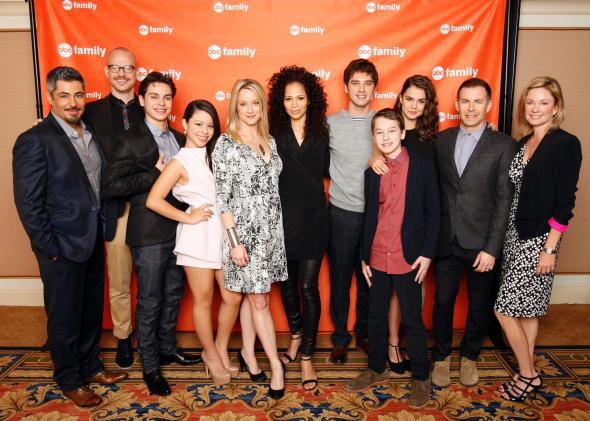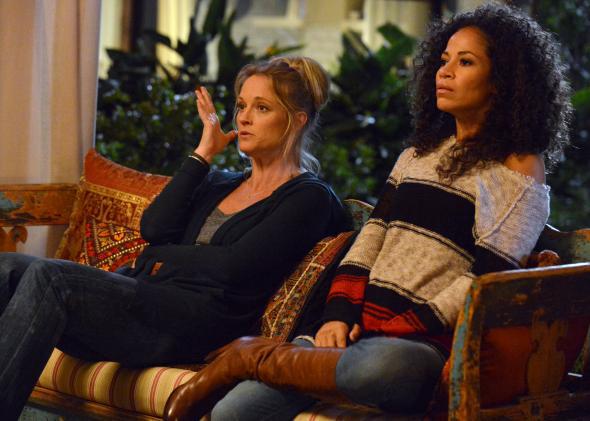The Fosters (ABC Family, Mondays at 9 p.m.) focuses on the lives of lesbian couple Stef Foster and Lena Adams (Teri Polo and Sherri Saum) and their five biological, adopted, and foster kids. With plot lines that ricochet from teen romance to the ways that work and parental responsibilities affect relationships, the show has also addressed issues like familial homophobia, the challenges faced by boys who don’t conform to gender stereotypes, and romantic attraction between foster siblings.
I spoke with The Fosters’ openly gay showrunners, Peter Paige (who played Emmett Honeycutt on Queer as Folk), Bradley Bredeweg, and Joanna Johnson (Caroline and Karen Spencer on The Bold and The Beautiful) at the recent Television Critics Association gathering.
Slate: The Fosters has enjoyed a more positive response than most gay TV shows receive. What have you done to avoid the usual pitfalls?
Johnson: Beyond our own sensibility, we’re on ABC Family, not Showtime. They’re not pushing us to have people in and out of bed all the time.
Bredeweg: At the same time, the network does support us when we want to go there. If we want to do a story about sex, they are gung-ho about it.
Paige: Whatever we’re doing, we want to make sure that it’s grounded in a messy, human, emotional truth. Whether it’s teen romance or lesbian bed death. What’s the reality of that—and what are all the different versions of that reality?
Slate: You have a lot of characters, and a lot of issues. This is family of seven, and they all have things going on. How do you avoid things ballooning out of hand?
Paige: Knowing when you’ve done it. We have so many characters that we love and that are complex and interesting. You want to serve them; you want to intersect them. You can draw a line between any two of our main characters on The Fosters, and you’ll get an interesting, specific, relatively unique relationship in the television landscape, and that’s really exciting.

Photo by ABC Family/Rick Rowell
Slate: I’m really interested in the character of Jude, who’s about 12 years old. He enjoys cross-dressing and he seems to be interested in other boys. Is it tricky when you’re thinking about a character that young?
Paige: We’re always interested in burgeoning sexuality, whatever it is. But I’m going to be really honest with you: I don’t think that we’ve decided anything definitive about Jude. Jude is curious, and we’re exploring that. As he comes together and decides to create a certain identity for himself, we’ll uncover it then, but I don’t think that conversation is by any means over for any of us.
Bredeweg: That’s a reflection of our times in a way. In certain communities, in certain cities, kids are coming up in a world in which they can explore those feelings and talk about them openly..
Paige: And not have it mean something conclusive or definitive. When I was a young gay man, I had encounters with lots of boys who grew up to be straight. I think it’s a very, very normal part of life.
Johnson: The story of Jude painting his nails was inspired by my son. He’s 7 now, but when he was about 5 and a half or 6, he had painted his nails blue, which is his favorite color. I caught him one night taking the polish off, and when I asked what he was doing, he said, “Well, my coach at gymnastics told me that only girls wear nail polish, so I’m taking it off so I can be a boy again.” It broke my heart. I said to him, “That’s not what makes you a boy.”
Paige: And the last beat of the story where [Jude’s friend] Connor shows up at school with nail polish? That is the moment that every kid who has ever felt different wants, knowing you have an ally, knowing somebody gets you and likes you, no matter what. If we leave anything in this world, if it’s just allowing people a little more permission to be who they are, I’ll be really proud of what we’ve done.
Johnson: Especially boys. Girls are allowed to express masculinity when they’re growing up. Being a tomboy—that’s a cute thing. Boys are not allowed to express as much. Boys grow up not being able to express their full self because they’re shamed by it, and that’s not fair.
Slate: What are you most proud so far?
Paige: We did the first same-sex marriage post-DOMA on television. The judgment came down while we were shooting the episode, and literally the next day, while we were shooting their wedding vows, it became legal again in California. They were getting married on-set the same day that Paul and Jeff—the Prop 8 plaintiffs—were getting married.
Bredeweg: I’ll never forget how proud I was watching those two women holding hands, telling each other they loved each other in front of their whole family.
Slate: As someone who doesn’t want to get married, though I live in a state where I could and have a long-term partner, I also appreciated that it wasn’t just, “Well, of course the gays want to marry.” You really explored that in a—I keep wanting to say, “in a kids show,” but it’s not a kids show, is it?
Bredeweg: It’s a family show.
Paige: One of my favorite things that I hear now on a regular basis is, “This is the show our family watches together. Our 10-year-old likes it; our 6-year-old gets challenged and asks questions; our 15-year-old likes it because they really see themselves depicted; and we like it because we feel like this is a relationship we understand, and this relationship to the kids we understand.
This interview has been edited and condensed.
